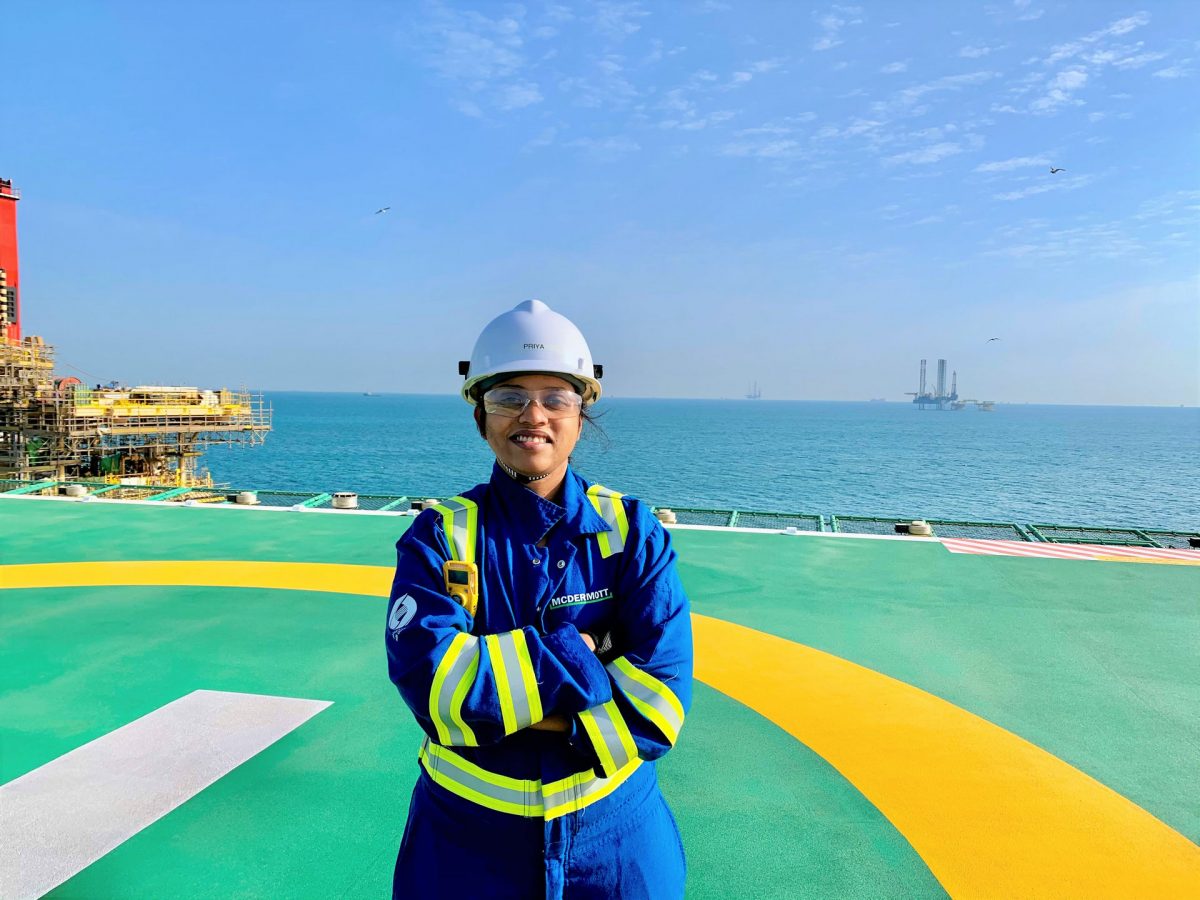Oil and gas companies have made continuous strides to reduce the industry’s gender disparity, and while challenges remain, barriers are being broken down.
One recent success story comes from Saudi Arabia’s offshore segment, where two McDermott engineers, Sreepriya Kurup and Anabelle Cayasa, became the first women to work on a long-term assignment offshore in the Kingdom.
“This is a historic achievement for all women in the Middle East EPCI industry who have dreamed of experiencing offshore work in the region, especially in Saudi Arabia,” says Kurup, who is still currently offshore . “This unlocks the door to many offshore opportunities for all of us.”
With Saudi Arabia’s Vision 2030 committed to increase female participation in the workforce from under 20% to 40%, this milestone is part of a wider trend. Yet, a 2019 study by the International Renewable Energy Agency estimates that only 22% of the global oil and gas workforce are women, even as the industry ramps up initiatives encouraging diversity, equity, and inclusion. “Being allowed to step onto a KSA offshore platform opens up the door and creates a broader opportunity for female representation in the oil and gas industry,” adds Cayasa, noting the warm welcome they received from the offshore team and the operator’s team.
Gentry Brann, Senior Vice President of the recently rebranded ‘People, Culture, and Communications organization at McDermott, says that especially within a global company, change has to be multi-faceted and driven by both employees and management alike.
“We are leveraging diversity, equity and inclusion as an organizational capability, embedded throughout the company and operationalized through cross-functional collaboration” she says. “Our DE&I strategy is an enabler for growth and can help unlock the full potential of our global and diverse workforce.”
While employees like Kurup and Cayasa are literally at the forefront in breaking gender barriers, McDermott’s employee resources groups are also instrumental in providing a diverse array of viewpoints and feedback to help determine priorities, goals, and ideas to improve diversity, equity, and inclusion.
“Our employees play a critical role in driving change, and the company is supporting them 100%. Employee resource groups, like the Global Women’s Network, have a growing role in holding our company accountable in terms of our DE&I goals,” Brann adds. “I told them, ‘let me be a sounding board, and tell me what changes we need to be making’.”
She also notes that McDermott is cognizant of cultural nuances across their operations, and how diversity can have differing meanings and requires specialized approaches in different parts of the world.In Saudi Arabia, the pace of change has exceeded the expectations of industry experts. Mike Sutherland, Vice President of operations for MENA at McDermott, noted that the scope of changes since his first trip to Saudi Arabia 15 years ago are an indication of the path ahead.
“There has been a major step forward for gender equality, and I think we are going to see a lot more happening as well. It’s a really good sign for progress,” Sutherland says, adding that there is more work to be done, and that this milestone “will see momentum picking up.”
Even as more women enter the oil and gas sector, they often fall into the administrative side of the business, working in the office rather than in the field. Tareq Kawash, Senior Vice President of EMEA at McDermott, wants to see stronger female representation across all aspects of the industry.
“We want to give them opportunities in the field, whether it’s offshore or on construction sites,” he says.
For Cayasa, this opportunity provided a new perspective on her work at McDermott. “The experience was incredible,” she says. “It changed my perspective about the offshore work environment. I understood the bigger picture of how the structures we fabricate in the Jebel Ali Yard become a live offshore platform.”
“I’m really proud that we are taking the lead here, that the restrictions have been lifted and that we can offer these opportunities, and that Priya and Annabelle have embraced it and taken the opportunity to go offshore,” Kawash adds. “I’m really excited about it, and I think this is just the beginning.”





